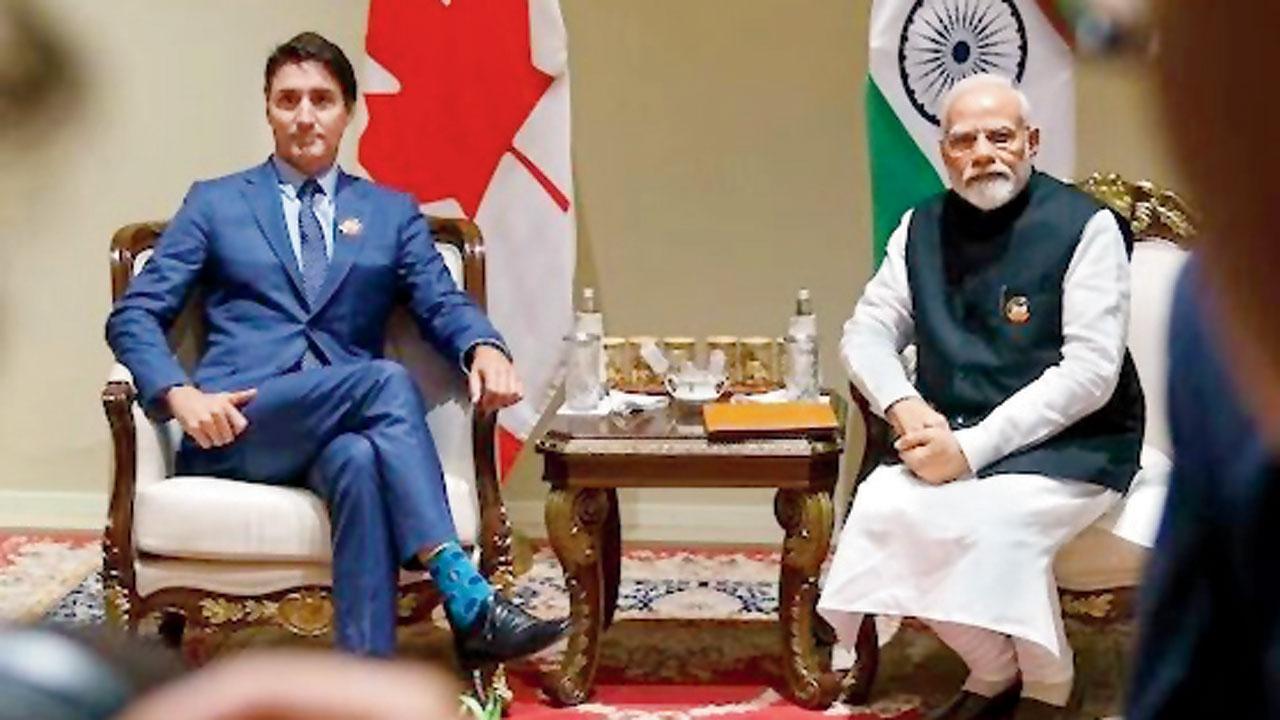The proposals were presented during the UN Human Rights Council Review meeting, where diplomats from India, Bangladesh, and Sri Lanka shared their insights and recommendations.

between India and Canada came under severe strain following Prime Minister Justin Trudeau’s allegations in September. File pic
In a significant diplomatic move, India has spearheaded recommendations for Canada to fortify measures preventing attacks on worship places and effectively address hate speech. The proposals were presented during the UN Human Rights Council Review meeting, where diplomats from India, Bangladesh, and Sri Lanka shared their insights and recommendations.
ADVERTISEMENT
Indian diplomat Mohammed Hussain noted legislative enactments such as the National Housing Strategy Act and the Accessible Canada Act while addressing the issue at the Council meeting. "We note the enactment of the National Housing Strategy Act, Accessible Canada act, and National strategy to combat human trafficking," said Hussain addressing the UNHRC review meeting.
India also recommended that Canada strengthen its domestic framework to prevent the misuse of freedom of expression, particularly for inciting violence. Additionally, India urged Canada to disallow activities of groups promoting extremism, prevent attacks on places of worship of religious and racial minorities, and enhance measures to address hate crimes and hate speech.
"India recommends the following to Canada - further, strengthen the domestic framework to prevent misuse of freedom of expression, for inciting violence and disallow activities of groups that are promoting extremism; effectively prevent attacks on places of worship of religious and racial minorities, strengthen legislative and other measures to address hate crimes and hate speech," he also said.
Bangladesh diplomat Abdullah Al Forhad commended Canada's progress in human rights protection and acknowledged the ongoing implementation of its strategy to combat human trafficking. However, Bangladesh recommended that Canada intensify efforts against racism, hate speech, hate crimes, and discrimination against migrants and Muslim minorities. They also called for measures to reduce carbon emissions and urged international cooperation in addressing climate change impacts.
"In spite of cooperation, Bangladesh offers recommendations to Canada: intensify its efforts to combat racism, hate speech, hate crimes, and discrimination against migrants and Muslim minorities, take necessary measures to reduce carbon emissions; strengthen international cooperation in addressing the negative impacts of climate change; and consider ratifying an international convention on the protection of the rights of all migrants, workers and members of their families," said Bangladesh's Al Forhad.
Meanwhile, Sri Lankan diplomat Thilini Jayasekara also recommended Canada accede to the Convention on the Protection of Rights of All Migrant Workers, take measures against racial discrimination affecting immigrants' rights, counter misinformation against minority communities, and strengthen its national mechanism for comprehensive reporting and follow-up on international human rights recommendations.
"Sri Lanka welcomes the cooperation extended by the Government of Canada during the visit of UN Special Rapporters on contemporary forms of slavery and on the rights of Indigenous people. Sri Lanka recommends Canada to one, accede to the Convention on the Protection of Rights of All Migrant workers and members of their families. Two, continue to take measures against racial discrimination, in particular to avoid discriminatory policies and regulations affecting the rights of immigrants, including in the area of health," said the Sri Lankan diplomat.
"Three, continue to take measures to counter misinformation against minority communities. Four, strengthen its national mechanism for comprehensive reporting and follow up in relation to recommendations received from international human rights mechanisms and treaty obligations. We wish Canada success in its UPR engagement," Thilini Jayasekara added.
Canadian PM Justin Trudeau introduced a fresh sour note in bilateral ties with India amid the continuing diplomatic standoff, affirming his earlier claim of Indian involvement in the killing of Sikh separatist leader Hardeep Singh Nijjar.
Earlier on Saturday, Canadian PM Justin Trudeau accused New Delhi of violating the Vienna Convention by "kicking out" 40 diplomats at a time when his country had reached out to the former and other global partners to get to the bottom of the murder.
Issuing a warning, the Canadian PM said if bigger countries can "violate international law without consequences", it will make the world "more dangerous".
Trudeau, however, added that Canada wants to "work constructively" with India, adding that Ottawa "will always stand up to the rule of law".
Last month, Canada pulled out 41 diplomats from India and also halted its visa and consular services in Chandigarh, Mumbai, and Bengaluru consulates in the wake of the Union government's decision to strip them of their immunity.
This came after New Delhi conveyed its concerns to Ottawa over the disproportionate number of diplomats in India and sought a 'parity' in diplomatic strength.
Accusing India of violating the Vienna Convention on Diplomatic Relations, Canadian Foreign Minister Melanie Joly said Ottawa removed 41 diplomats and their 42 dependents from India amid the ongoing diplomatic sabre-rattling between the two countries.
However, the Ministry of External Affairs (MEA) responded by saying that no international norms were violated in India, seeking parity in the mutual diplomatic presence in New Delhi and Ottawa.
Earlier, in September this year, Trudeau alleged the involvement of "agents of the Indian government" in the killing of the Khalistani terrorist.
India rejected the allegations as "absurd and motivated" and expelled a Canadian diplomat in a tit-for-tat move after Ottawa asked a senior Indian diplomat to leave.
New Delhi also halted visa services to Canada but later decided to resume services for four categories after a "considered review of the security situation".
Notably, Canada has not been able to present any evidence to back its claims over the killing, according to the MEA.
This story has been sourced from a third party syndicated feed, agencies. Mid-day accepts no responsibility or liability for its dependability, trustworthiness, reliability and data of the text. Mid-day management/mid-day.com reserves the sole right to alter, delete or remove (without notice) the content in its absolute discretion for any reason whatsoever
 Subscribe today by clicking the link and stay updated with the latest news!" Click here!
Subscribe today by clicking the link and stay updated with the latest news!" Click here!







